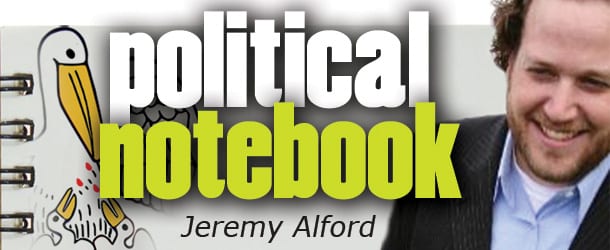If Congressmen Charles Boustany and John Fleming run for the U.S. Senate next year, the 3rd and 4th Districts will become open seats.
Already there’s a lot of momentum in the Lafayette-Lake Charles-anchored district.
“I’m gearing up for what I believe will be an open seat. I’m in. I am running,” said state Rep. Brett Geymann, R-Lake Charles. “I’ve already started meeting with folks across the district, and I’m building an organization.”
Also mentioned as a possibility is Lafayette City-Parish President Joey Durel, who is term-limited and recently endorsed U.S. Sen. David Vitter for governor.
In northwest Louisiana’s 4th Congressional District, Caddo Assistant District Attorney Jason Brown is telling people he’s interested. In addition, a quiet buzz is building about Mike Reese, a Leesville businessman and leader of the community advocacy group Fort Polk Progress, who describes himself as a moderate Republican.
A wildcard is former Shreveport mayor and one-time state legislator Cedric Glover, who has also been mentioned as a potential state Senate candidate.
Lawmakers Get ‘F’
The annual legislative scorecard compiled by the Louisiana Assoc. of Business and Industry was released July 14. It included a grade of “F” for 94 members of the Louisiana Legislature.
It’s a big deal for some lawmakers, who rely on their scores to trigger campaign donations from LABI’s political action committees and the PACs operated by other groups. The need for cash and support is even more noticeable this year, with elections slated for the fall.
It’s no secret that lawmakers leaned heavily on business to close a $1.6 billion budget shortfall, passing a slew of measures that amount to tax increases. Although LABI and others managed to negotiate sunsets on the measures, meaning they’ll expire in one to three years in some cases, the business lobby walked away from the session feeling many lawmakers had switched jerseys in the final session of their term.
“The scorecard will reflect that,” said LABI president Stephen Waguespack, who wrote in the scorecard’s introduction that “this was the highest tax increase in Louisiana in decades.”
The majority of lawmakers received a grade of “F” this session, with 64 failing in the House and 30 in the Senate. These low scores will make pulling money out of LABI’s political action committees this fall all the more difficult. It could also open up new opportunities for incumbents to be challenged.
Only two lawmakers failed to break 20 percent: Rep. Jack Montoucent, D-Crowley, with 16 percent, and Sen. David Heitmeier, D-New Orleans, with 18 percent.
On the other end of the spectrum, only 12 lawmakers earned “A” grades.
According to Camille P. Conaway, LABI’s vice president for policy and research, the bills that raised taxes were weighted heavily in the scorecard, pulling down the 2015 and overall cumulative scores for a number of legislators. Between half and two-thirds of the 2015 score relies on the tax votes, she added.
But LABI isn’t the only group with a scorecard that causes heartburn for tax-supporting Republicans. The Louisiana chapter of the conservative Americans For Prosperity recently released its tally.
AFP has already sunk $60,000 into radio ads promoting LouisianaScorecard.com. It may dump just as much into fall field operations, such as door-to-door outreach and online advertising. “It was a disappointing session, with legislators throwing tax after tax at the wall to see what would stick,” said AFP’s state director Phillip Joffrion.
The radio spot lashes out at lawmakers for passing “gimmicks, short-term fixes and over $700 million in tax hikes” to balance the budget, and for adopting “a scheme to usher in Obamacare’s Medicaid expansion.”
Senate Race Revs Up
With senior U.S. Sen. David Vitter running for governor, and leading the polling and fundraising wars, three high-octane Republican politicians are already sounding like likely candidates for the Senate seat — Congressmen Charles Boustany and John Fleming and state Treasurer John Kennedy.
The biggest news of late comes out of the Kennedy camp. His top aide of 18 years, deputy treasurer Jason Redmond, is leaving his position with the treasury and has filed documents with the Federal Election Commission to form the Louisiana Proud super PAC. So far it’s the first independent expenditure committee for the next cycle that could raise unlimited amounts of money and spend it to promote, or demonize, candidates.
Contacted for comment, Redmond said, “It will be actively involved in the 2016 elections.” As for whether it’s specifically for a Kennedy Senate bid, he added, “I can’t say right now.”
Redmond had created the Watchdog PAC in the spring, saying at the time it might become a vehicle to promote policy issues important to Kennedy.
As for Fleming, he’s been reminding donors that any cash they hand over right now can be used to back a possible Senate run in 2016. He’s also started spending campaign money with media strategist Brabender Cox, one of the original hands that helped Vitter first claim his Senate seat.
Boustany is telling crowds he’s eyeing the Senate. The Lafayette Republican recently hired as his general consultant Justin Brasell, who’s managed campaigns for U.S. Sens. Tom Cotton, Mitch McConnell and John Thrune. Brasell confirmed he’s gearing up to run another campaign in Louisiana this fall.
Of course, Vitter could change all that should he lose his quest to capture the governorship. That’s because Boustany and Fleming have suggested they may not run if Vitter seeks re-election to the Senate. But a Vitter defeat for governor won’t bode well for a re-election push just a year later, and just might prompt Boustany and Fleming to run anyway.
Fleming’s latest campaign finance report filed with the FEC shows $742,000 raised in the second quarter, with $2 million in the bank. Boustany raised a quarterly best of $708,000 and has $1.1 million cash on hand.
Kennedy, meanwhile, has $3.5 million in his state account as of late April with re-election in the fall very likely. Kennedy can’t use the state account to run for the U.S. Senate, but he could donate to a super PAC that’s supportive of his efforts. This would be similar to what Vitter’s done with his federal account and the Fund For Louisiana’s Future super PAC. Kennedy could also choose to spend some of the dough on a massive media buy to remind voters about his brand.
Then there’s the authority Vitter would have, as governor, to appoint his successor, who would be viewed as an early favorite for the Senate seat in 2016 unless Vitter makes the individual promise not to run. It seems everyone around the political quilting circle in Louisiana has an opinion about what Vitter would do under such circumstances. But few know for certain.
More Session Lawsuits?
The possibility of litigation about legislation passed this year has often been discussed in Baton Rouge.
So far, one lawsuit has been filed to challenge a resolution passed by the House and Senate. But some aren’t convinced that the trips to the courthouse are over.
“I think it’s too early to tell,” said Stephen Waguespack, president of the Louisiana Assoc. of Business and Industry. “I think there are other folks who are looking at it right now. I would not be surprised to see more. After the first hearings, others might decide to follow suit.”
The Louisiana Chemical Assoc. has filed for a declaratory judgment in Baton Rouge asking a state district court to declare the tax hike in HCR 8 unconstitutional. That’s the measure that suspends for one year the .97 percent sales tax exemption business and industry enjoy on utilities. LCA argues the Legislature did not obtain the constitutionally required two-thirds vote. House Clerk Butch Speer has said he expects the Legislature to win the case.
Business and industry questioned the vote threshold of other tax bills this session; they criticized one bill as being an instance of double taxation.
Freshman Congressman Avoids Endorsements
While other members of Congress from inside Louisiana and out dish up endorsements for governor and attorney general and other posts, freshman U.S. Rep. Garret Graves of Baton Rouge has remained quiet following his solid win in the 6th Congressional District.
Those close to him say that may very well be the Republican’s approach heading into the fall. Time will tell.
“His priority right now is not to tell people who to vote for,” said Graves spokesperson Kevin Roig. “He was sent to Washington to work on the policies and issues that are important to folks back home, and that’s his focus right now.”
Anti-Union Policy Push To Be Revived
As Louisiana proponents of legislation to ban automatic deductions of union dues from public payrolls look ahead to 2016, they’re trying to glean lessons from similar debates in other states this year.
Like the Legislature here, which saw its anti-union bill stalled on the House floor after committee passage, legislators in Texas failed to move a comparable measure after it was advanced by the Senate. During the session’s final moments in Texas, a vote was not scheduled, as concerns were voiced about the political burdens it would place on lawmakers, with both unions and business heavily lobbying the issue.
That kind of noisy debate was shaping up in Louisiana when Rep. Stuart Bishop, R-Lafayette, decided not to push for a vote on the House floor during the recent session as his colleagues asked for relief from the pressure. Bishop, however, has said since then that he is planning to re-file the bill in 2016, and it will be his first piece of legislation introduced.
In Oklahoma, lawmakers did manage to pass a bill prohibiting automatic deductions, but only for unions with monopoly-bargaining privileges at public schools and higher education institutions. Supporters claimed the bill was watered down, since it did not capture all union activity. But they still cheered it as a first step.
Lobbyists who are tracking the issue nationally are already predicting the 2016 model bills for other states, possibly even Louisiana, may defer to the scaled-back approach seen in Oklahoma.
In Kansas, a payroll deduction bill stalled this year after opponents amended it to include bans on donations to charitable organizations, like United Way. Lawmakers in the Louisiana House were planning the same treatment for Bishop’s bill before it was stalled, offering an early preview of defensive maneuvers that may resurface in 2016.
LED’s New Asst. Secretary
Mandi D. Mitchell, who cultivated a savvy reputation at the office of Louisiana Economic Development while she was handling legislative affairs, congressional relations and federal programs, has been promoted to assistant secretary.
The staff at LED were made aware of the personnel change late in June by new Secretary Steven Grissom, who was appointed to replace Stephen Moret, now the CEO and president of the LSU Foundation.
In a letter to his staff, Grissom called Mitchell a “state and community leader,” noting her previous lobbying work at AT&T Louisiana.
Mitchell is expected to retain her previous responsibilities of handling legislative and congressional issues. But her new role also includes managing business intelligence, community competitiveness, small business services and state economic competitiveness, according to LED’s website.
The promotion places Mitchell in the No. 2 position at LED as elections for the next governor and Legislature get underway this fall. New governors traditionally bring in a new slate of department and agency heads. But it’s not unheard of for them to retain secretaries and undersecretaries.
For more Louisiana political news, visit www.LaPolitics.com or follow Jeremy Alford on Twitter @LaPoliticsNow.














Comments are closed.